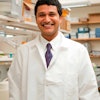At first he wanted to be a lawyer, but high school teachers steered Carlos D. Bustamante toward science, which he found more interesting. So he set out to become a doctor, like his father, until he discovered his true calling while working as a college freshman in a lab.
His ultimate career choice was affirmed last fall when the MacArthur Foundation named the population geneticist one of its “genius” award recipients. The honor underscores Bustamante’s rapid ascent in a field that, with the mapping of the human genome and others, has presented new opportunities to explore the evolution of different species. His research has ranged across the animal and plant worlds — and stretched around the globe.
“We’re interested in understanding how genes impact traits, so in humans that might be height or weight or disease susceptibility or hair color. In cattle, it might be milk yield,” says Bustamante, who has also researched the genetic structure of cultivated plants, such as rice, coffee and cacao, the main ingredient in chocolate.
“He’s kind of like the trifecta of major talent,” says Dr. Esteban González Burchard, associate professor of biopharmaceutical sciences and medicine at the University of California, San Francisco, referring to Bustamante’s experience in human, animal and plant research. “I think that’s what separates him from others in the field.”




















